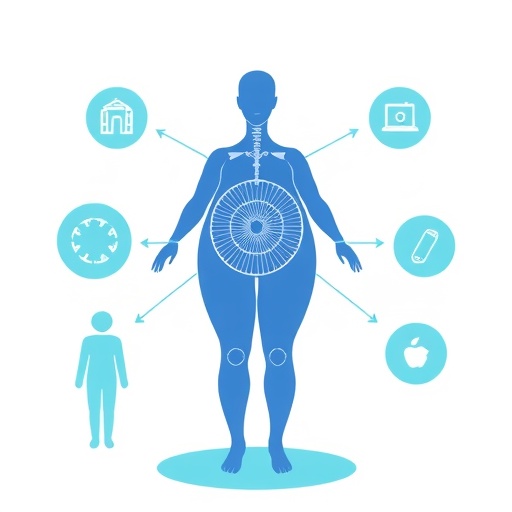In recent years, the interface between technology and health has increasingly captured the attention of researchers and the general populace alike. With obesity becoming a mounting concern internationally, innovations aimed at addressing the conditions surrounding overeating are critical. A breakthrough has emerged from the laboratories of Northwestern University, where a dedicated team has developed a triad of wearable sensors designed to capture the nuances of real-world eating behaviors in a significantly enhanced manner.
The research team, spearheaded by Nabil Alshurafa, an associate professor of behavioral medicine and computer engineering, recognized that traditional treatment methods often neglect the unconscious habits that contribute to overeating. They devised a system utilizing three distinct devices: a necklace monitoring eating behaviors, a wristband tracking movement, and a pioneering body camera. The latter is equipped with thermal sensing capabilities, uniquely designed to activate recording only when food enters its field of view. This innovation ensures the respect of privacy while providing crucial behavioral data.
Over a two-week period, a cohort of 60 adults living with obesity donned these ingenious devices, coupling their usage with a smartphone application that prompted users to log their meal-related moods and contextual factors. The data generated was staggering, amounting to thousands of hours of video footage and sensor readings that illuminated the complex dynamics of overeating patterns, which varied markedly between individuals. The researchers identified five distinct patterns of overeating, demonstrating that this behavioral issue is far from monolithic.
These patterns encapsulate diverse situations: from indulging in take-out meals to late-night snacking driven by emotional triggers. Each identified pattern reflects a rich tapestry woven from environmental influences, emotional stimuli, and ingrained habits. The research findings challenge the traditional narrative surrounding overeating, providing a framework from which personalized interventions can emerge. Alshurafa emphasizes that this innovative approach offers a roadmap for guiding individuals towards healthier eating habits, suggesting that personalized interventions can be more effective than one-size-fits-all prescriptions.
The methodology behind the study is particularly noteworthy. The sensors not only record quantifiable data about eating behaviors, including the number of bites taken or the speed of chewing but do so passively. This method circumvents issues of reliability linked with self-reported eating habits, often marred by inaccuracies and social desirability biases. As lead author Farzad Shahabi articulates, utilizing passive sensing techniques allowed the team to expose consumption patterns previously obscured by the limitations of conventional data collection methods.
The body camera, known as HabitSense, marks an evolution in data collection concerning dietary behaviors. By applying advanced thermal sensing technology, HabitSense records only those actions relevant to food interactions. This tailored approach minimizes privacy concerns compared to traditional surveillance cameras or egocentric systems, which capture broader contexts that may include non-consensual imagery of bystanders.
Simultaneously, the NeckSense necklace complements this sophisticated system by meticulously recording various eating behaviors. It stands out in the realm of wearable technology as the first of its kind to effectively monitor eating dynamics in real time. The implications of such detailed tracking could redefine the landscape of obesity treatment by closely observing patient behaviors rather than relying on potentially flawed self-reports.
Alshurafa’s personal connection to this research adds an important layer of empathy to the scientific pursuit. A longstanding struggle with his own weight has fueled his passion for this research area, creating a powerful drive to reshape obesity treatment modalities through a blend of computer science, behavioral medicine, and curiosity. This personal narrative resonates strongly, bridging the gap between scientific rigor and human experience, fostering a comprehensive understanding of the emotional landscape surrounding food consumption.
As the research progresses towards potential applications in real-world scenarios, clinicians are reportedly eager to collaborate with the Northwestern team to pilot tailored intervention trials. This partnership between scientists and clinicians aims to deploy personalized behavior change programs that directly respond to the unique patterns identified among individuals suffering from overeating issues. It promises a future where health technology files become less prescriptive and more collaborative, enhancing user experiences and outcomes.
Looking towards the future, this study marks the beginning of a significant shift in how obesity and overeating are approached in medical and technological realms. Alshurafa envisions a world where health interventions are informed by granular data, providing insights that pave the way for sustained behavioral change. With this innovative approach, researchers aim to provide targeted solutions that resonate with individuals’ real-world experiences and challenges, ultimately leading to healthier lifestyles.
In conclusion, the advancement of this innovative trio of wearable sensors underscores how technology can be leveraged to tackle complex health issues like obesity. By focusing on the intricacies of eating behaviors through advanced data collection and personalized interventions, the research opens up new avenues for treating overeating, fostering a collaborative environment between technology developers, healthcare providers, and patients. Such initiatives will not only contribute to individual well-being but also pave the way towards tackling the alarming rise of obesity on a broader societal scale.
Strong implications arise from the findings of this research, suggesting pathways to more compassionate and user-centered health solutions. The integration of wearables into behavioral treatment plans could revolutionize the management of obesity, marking a transformative step in healthcare’s ongoing journey towards personalization and partnership. These developments hold potential far beyond the confines of academic study, standing to make a real impact in the lives of individuals grappling with the challenges of overeating.
Subject of Research: Wearable technology for monitoring eating behaviors related to obesity
Article Title: Unveiling overeating patterns within digital longitudinal data on eating behaviors and contexts
News Publication Date: September 17, 2025
Web References: Northwestern University
References: n/a
Image Credits: Credit: HABits Lab, Northwestern University
Keywords
Obesity, Body mass index, Weight loss, Nutrition, Artificial intelligence, User interfaces.




